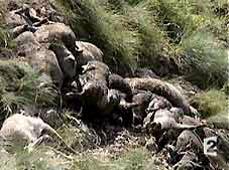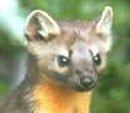In addition to the ubiquitous and frankly tedious cow, the brown bear is an important symbol for the Swiss, and in particular for the inhabitants of the capital, Bern, which was named after the bear. Admittedly, this could have happened under more auspicious circumstances, since the town was founded in 1191 by Duke Berthold V of Zaehringen after he killed a bear there in the course of a hunt (apparently). As it happens, the nature of the relationship between the Swiss and the bear never really changed all that much, and the last reported bear in Switzerland was shot in 1904.
The bear in question was sighted by three people in the Ofen Pass National Park in the Graubuenden, a region which is about as mountainous, rural and remote as it can be in Europe. It also shares the characteristics of many other locations with a similar topography: it's insular, riven with incomprehensible rivalries and people have a tendency to dislike those from the next valley, let alone foreigners. In fact, the good people of the Graubuenden were instrumental in making sure that it remained very, very difficult for anyone to gain Swiss citizenship.
So the question that the locals must ask themselves is whether they are prepared to welcome Meister Petz home. After all, according to Swiss law, the final say on whether or not someone is accorded citizenship belongs to local communities, and they don't come much more local than those in the Graubuenden. If I were them, I wouldn't worry about the bears. There are never very many and by and large, they keep themselves to themselves (until they take a dislike to you and rip your face off). However, they may have a legitimate gripe if the wolves that have reestablished themselves in France, having travelled from Italy, turn up. One tried it last year, but the fresh mountain air must have disagreed with it because it promptly found itself dead. The fact remains that French experience reveals that wolves have learned some new tricks since they were last in the vicinity.
In 2002, the newly arrived French pack came up with a brilliant idea: why bother running down roe deer which aren't very big and are pretty fast and agile, when you can kill 400 sheep in one go with next to no effort? The result was this:

How do they do it? Well they just scare a herd of sheep towards a cliff edge and watch them plummet to a messy death. You can see how this would annoy the locals quite badly. As a result the French PTBs authorised the killing of some of the culprits. However despite the fact that there is a branch of French administration specifically charged with dealing with wolves (the Lieutenants de Louveterie were instituted by Charlemagne), it's turned out that so far, no-one has been able to remember how you hunt wolves and I'm not aware of any success. Bears by comparison regularly get themselves shot by mistake, as happened to a female named Canelle a year ago.
As a pine marten, I welcome the return of the bear to Switzerland. Switzerland without bears is like Australia without kangaroos. So let's just hope that this bear stays there for the requisite minimum of twelve years and can convince the locals that it is willing to make the effort to be a good Swiss citizen. It's going to have to learn to speak Romanche first though.


No comments:
Post a Comment